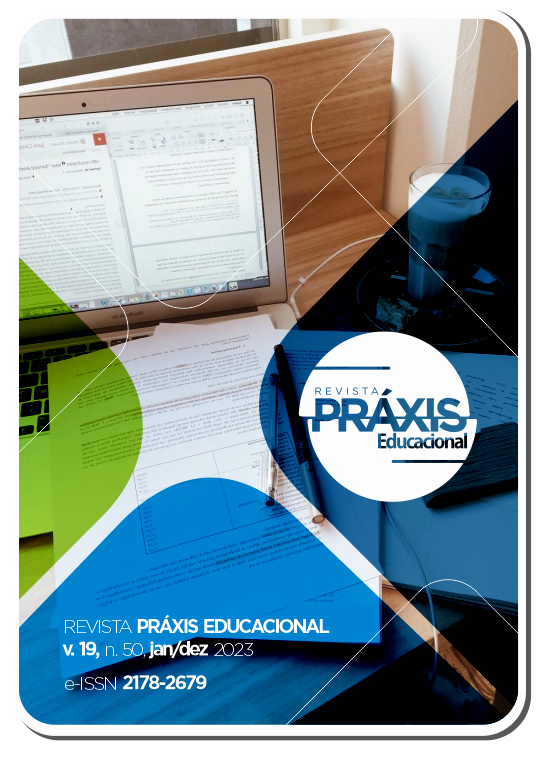Historical-dialectic materialism: reflections on the method
DOI:
https://doi.org/10.22481/praxisedu.v19i50.11958Keywords:
foundations theoretical-epistemological, historical-dialectical materialism, MarxAbstract
This text presents reflections that underpin the debate on the historical-dialectical materialism method. The objective of the work is to understand the production of knowledge in Marx and his contributions to the epistemological field. For this, bibliographical research is adopted as a methodology seeking to identify, from the works of Marx (Marx, 2013; 2011; 2008; 2004) and other authors (Tonet, 2013; Chasin, 2009; Netto, 2009; Duarte 2008; Marx; Engels, 2007; Kosik, 2002), the difficulties of addressing the methodological resolution in Marxian production and present the basic assumptions that allow us to understand that there is a type of theoretical-epistemological production in Marxian and Marxist works. It discusses the ontological question of Being, the method and the production of knowledge in Marx. It is concluded that there is no explanatory path on the method, but theoretical-methodological indications that expose a consistent and articulated framework around the understanding of reality and Being. This analytical framework clarifies not only the ontology of Being and its relationship with reality, but also transforms the way of thinking and doing science in modernity. Thus, it is understood that Marxian theory represents a great qualitative leap for the production of scientific knowledge, since it advances in important points for the progress of criticism of speculation, as well as for the understanding of central categories that explain the problematic of knowledge and its relationship with social practice.
Downloads
Metrics
References
CHASIN, José. Método dialético. Aulas ministradas durante o curso de Pós-Graduação em Filosofia Política, promovido pelo Departamento de Filosofia e História da Universidade Federal de Alagoas, de 25/01 a 06/02/1988. [s. l.], 2010. Disponível em: https://orientacaomarxista.blogspot.com/2010/10/metodo-dialetico-jose-chasin.html?m=1. Acesso em: 23 mar. 2023, 17:04.
CHASIN, José. Marx: estatuto ontológico e resolução metodológica. São Paulo: Boitempo, 2009.
DUARTE, Newton. Sociedade do conhecimento ou sociedade das ilusões? Quatro ensaios crítico-dialéticos em filosofia da educação. Campinas, SP: Autores Associados, 2008.
KOSIK, Karel. Dialética do concreto. 7. ed. Rio de Janeiro: Paz & Terra, 2002.
MARX, Karl. Manuscritos econômico-filosóficos. São Paulo: Boitempo, 2004.
MARX, Karl. Contribuição à crítica da economia política. 2 ed. São Paulo: Expressão Popular, 2008.
MARX, Karl. O Capital: crítica da economia política. Livro I. O processo de produção do Capital. São Paulo: Boitempo, 2013.
MARX, Karl. Grundisse: manuscritos econômicos de 1857-1858: esboços da crítica da economia política. São Paulo: Boitempo, 2011.
MARX, Karl; ENGELS, Friedrich. Ideologia alemã: crítica da mais recente filosofia alemã em seus representantes Feuerbach, B. Bauere Stirner, e do socialismo alemão em seus diferentes profetas (1845-1846). São Paulo: Boitempo, 2007.
NETTO, José Paulo. Introdução ao método da teoria social. In: ABEPSS. Serviço social: direitos e competências profissionais. Brasília: CFESS/ABEPSS, 2009. p. 667-696.
TONET, Ivo. Método científico: uma abordagem ontológica. São Paulo: Instituto Lukács, 2013.
Downloads
Published
How to Cite
Issue
Section
License
Copyright (c) 2023 Práxis Educacional

This work is licensed under a Creative Commons Attribution-ShareAlike 4.0 International License.
You are free to:
Share - copy and redistribute the material in any medium or format; Adapt - remix, transform, and build from the material for any purpose, even commercially. This license is acceptable for Free Cultural Works. The licensor cannot revoke these freedoms as long as you follow the terms of the license.
Under the following terms:
Attribution - You must appropriately give credit, provide a link to the license, and indicate if any changes have been made. You may do so in any reasonable way, but not in a way that suggests that you or your use is endorsed by the licensor.
There are no additional restrictions - You cannot apply legal terms or technological measures that legally restrict others to make any use permitted by the license.










